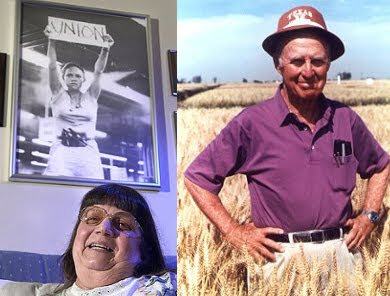Crystal Lee Sutton and Norman Borlaug

Crystal Lee Sutton died on September 11th of cancer at 68. Norman Borlaug died the next day, also of cancer, aged 95. I'll admit I'd never heard of either. Crystal Lee Sutton, the real life inspiration for Martin Ritt's Carter-era film Norma Rae-- I just assumed she was fictional, but she was real, and apparently the most famous scene from the film really happened:
She received threats and was finally fired from her job. But before she left, she took one final stand, filmed verbatim in the 1979 film Norma Rae. “I took a piece of cardboard and wrote the word UNION on it in big letters, got up on my work table, and slowly turned it around. The workers started cutting their machines off and giving me the victory sign. All of a sudden the plant was very quiet…” Sutton was physically removed from the plant by police, but the result of her actions was staggering. The Amalgamated Clothing and Textile Workers Union won the right to represent the workers at the plant on August 28, 1974.
-from her website, www.crystalleesutton.com
I don't know if you can film something verbatim per se, but that's a trifling objection. According to the Institute for Southern Studies
Several years ago, Sutton was diagnosed with meningioma, a type of cancer of the nervous system. While such cancers are typically slow-growing, Sutton's was not -- and she went two months without potentially life-saving medication because her insurance wouldn't cover it initially. Sutton told the Burlington (N.C.) Times-News last year that the insurer's behavior was an example of abuse of the working poor:
"How in the world can it take so long to find out [whether they would cover the medicine or not] when it could be a matter of life or death," she said. "It is almost like, in a way, committing murder."
Though Sutton eventually received the medication, the cancer had already taken hold. She passed away on Friday, Sept. 11 in a Burlington, N.C. hospice.
Norman Borlaug was also an incredible person, albeit of a very different cast. After receiving his PhD at the age of 28 he went to work for the US military in WWII, first developing a saltwater-resistant adhesive that allowed US forces to jettison watertight boxes of canned food to troops stranded on Guadalcanal island. In the years after the war he was instrumental in developing disease-resistant high yield crops that helped India be able to produce enough food to feed all her people.
He won the Nobel Peace prize in 1970, and consequently his passing made a lot more news than Sutton's. I don't mean that as sarcasm-- he certainly helped a lot more people. But also it occurs to me that although they were both humanitarians, his story, broadly speaking, has a certain uncomplicated quality, at least from the point of view of corporate news outlets. American scientist helps feed world, is justifiably celebrated, dies after a long rewarding life. Sutton's story is less rewarding for the corporate media to tell, because it is less sunny, underscoring the hostile legal climate that unions inhabit in the US, as well as our vanishing industrial base.(She worked in a clothes factory in North Carolina, and today most domestic clothes production has been exported out from under us.) Even the end, with her conflict regarding her insurance, is a story the corporate media isn't so eager to relate to us. Katie Couric didn't mention that last bit on the CBS news, but at least she mentioned her.
You can find less sunny aspects to Bourlag's story if you are really determined; he was an early proponent of DDT*, for example,but so were a lot of people. Nevertheless he was always trying to help people, and there's no question on balance he did, tremendously. Yes, Borlaug was a booster of genetically-modified foods. But at least until we can figure out how to feed everybody, stop raping the planet, and substantially shrink the world population(through as-yet undiscovered, ethically and socially doable means), I'd say his way is the right way for much of the third world, handily trumping lefty-doctrinaire objections.
I'm not keen on some of the particulars of corporate farming, like counterproductive US subsidies of ethanol or patenting seeds and telling third-world farmers they're intellectual property, but screwy consequences like that were not Bourlag's doing.
I don't have a penetrating, overarching point in discussing Sutton and Bourlag-- my blogging is often simply a record of efforts at my self-education, and I wanted to take note of their passing.
"*Food Security and Agriculture" by Devinder Sharma
Labels: activism, culture, death, healthcare, science, society, women




